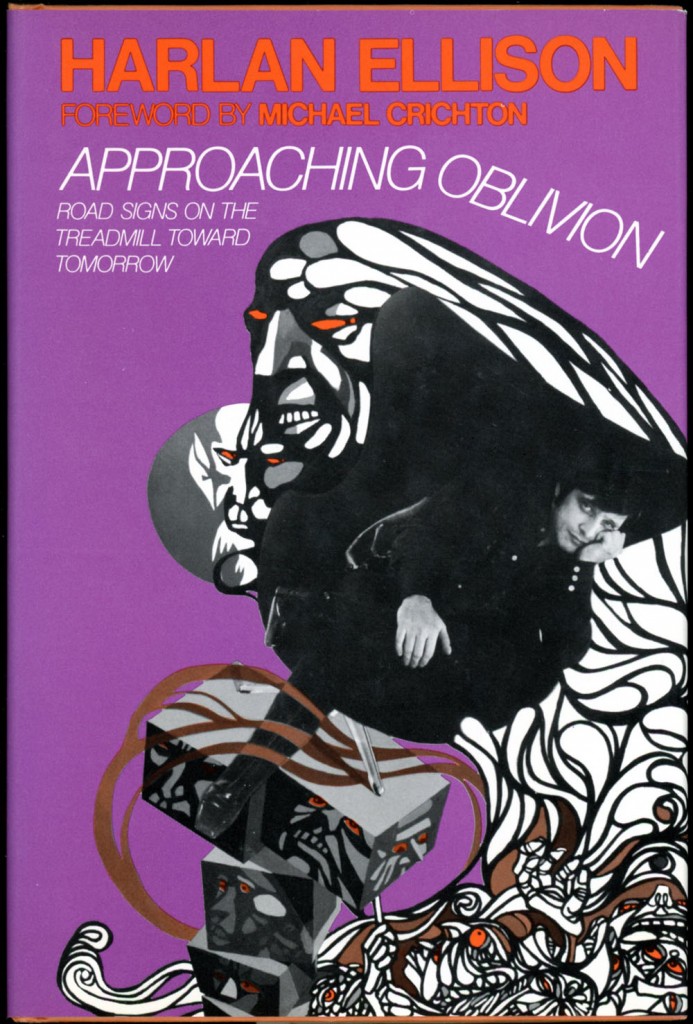MOST CREATIVE PEOPLE want to be remembered after they die for their art — not bad divorces, bad-boy tantrums, sexual harassment, or general pugnacious behavior. I think that Harlan Ellison, who died in his sleep last week at the age of 84, would have been appalled at all the obits that give as much weigh to his antagonistic behavior — at times — as to his writings. Some of these obits have compared Ellison to Hemingway and Norman Mailer, but they are not talking about literary merit.
These are two writers that Ellison wouldn’t have mind being linked to — in a literary context. The bad behavior is another thing. Some of this bad press is due to Ellison’s own myth making over a long career, including the fist and knife gang fights, run-ins with mafioso thugs, and a take-no-prisoners mindset when it came to dealing with editors, publishers, movie producers, network tv honchos, and fugghead fans. I can well believe one story that as a young author Ellison, after being stiffed on payment for a piece of writing, made a visit to the magazine office and ran out with a stolen typewriter that must have weigh a quarter of his own weight. But I don’t believe another story — when Ellison supposedly punched a network executive hard enough that he hit a wall and broke his hip — though Harlan would have been happy to tell you that story in detail. If Ellison had done a fraction of the violent things he, or his detractors, said he had done, Ellison’s career would have been more like that of Chester B. Himes, who spent time in prison.
Ellison could be violent verbally, not to say that he was violent physically. Many times the object of his literary/verbal violence was justified, sometime not so much. Anger could get the best of him. But another trait in him was remorse. The macho posing belied a person bullied much of his childhood. As a grown-up he was not someone who suffered people he believed were trying to take advantage of him.
The last time I spoke to Ellison was some years ago when he phoned me, after his internet posse had “alerted” him to a book that I was suppose to be doing that used one of his stories without authorization. He was pissed-off until I explain things to him — by the end of the phone call he was offering all sorts of advice and support, and recommending stories of his for the project.
Now Harlan did not use a computer, and did not understand the internet. I don’t thing he realized that it was like an iceberg, with truth making up the flea on the penguin standing on the tip, and the gigantic underwater bulk of the iceberg being all the BS of everything else. So Harlan had a knee-jerk reaction — that fear, always, of being taking advantage of, of being bullied, is in his DNA. Did Harlan do some bad things? YES. Should his lifework be forever linked to, and devalued, because of all the bad things people think he has done? I don’t have an answer to that question. I think there will be more stories coming out about him — good and bad — in the coming years. My bet is that there will be more good than bad.
But all of these obits… My friend Paul Di Filippo has called the writers of these types of obits “graveyard ghouls”. I agree, it is fashionable nowadays to print myths told in the crowd than do the hard work of looking into the heart and soul of a complicated human being.
I will also point at Nat Segaloff’s recent bio of Ellison, A LIT FUSE, which, like these obits, does little to balance Ellison writings and his own macho-myth-fantasy. Why do people behave the way they do is one of those cosmic questions? Towards the end of A LIT FUSE we are told that in 2010 Ellison was diagnosed as bipolar shortly after attempting to end it all, like Hemingway, with a gun. Suddenly, without much of a lead-in, Segaloff is ticking off boxes on a behavior health clinic intake sheet: Attention Deficit Disorder, hyperactivity, obsessive-compulsive, father issues.
There is an emotional analgesic effect that Ellison appears to have gotten from writing and Segaloff’s info-dump, late into a long bio, without any insight or any real sympathy, does not enlighten the proceedings.
Neither do all of these “graveyard ghouls” obits. Harlan Ellison deserved better.

Write a Comment